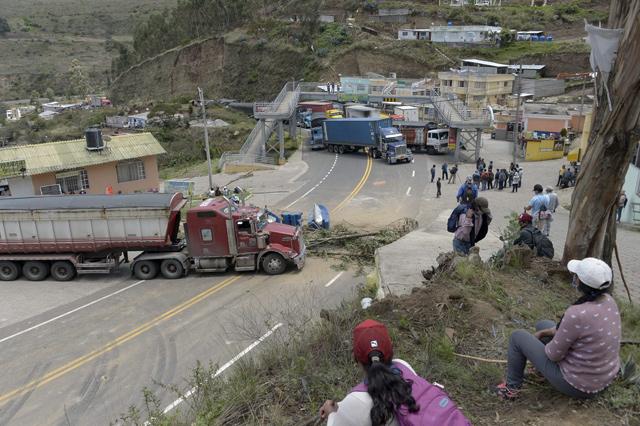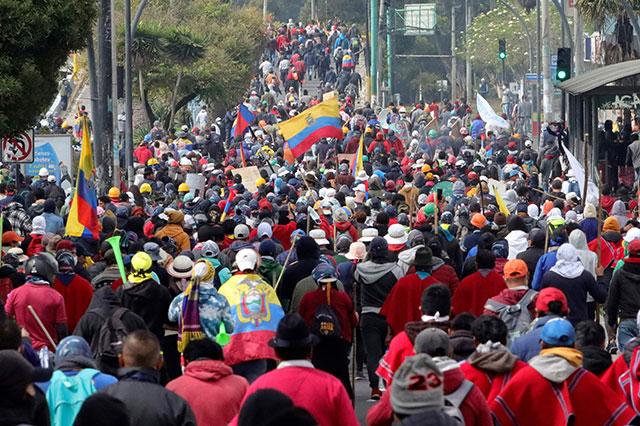You are here
Ecuadorans block roads on day 2 of fuel price protests
By AFP - Oct 27,2021 - Last updated at Oct 27,2021

Indigenous people and farmers block a road in Oton, Pichincha province, Ecuador, on Wednesday (AFP photo)
QUITO — Indigenous and rural Ecuadorans blocked roads in several provinces on Wednesday on the second day of protests against soaring fuel prices amid a countrywide state of emergency.
On Tuesday, 37 people were arrested and five police officers, a journalist and at least one demonstrator injured in the largest protests since conservative President Guillermo Lasso took office in May.
Protesters disrupted traffic in five of Ecuador's 24 provinces on Tuesday, and vowed to continue their show of discontent with the new centre-right government's economic policies.
"The government has messed up, pushing fuel prices up all the time," protester Dennis Viteri, a 28-year-old textile worker told AFP on Wednesday at Calderon, northeast of the capital Quito.
Viteri and others used soil, tree trunks and burning tires to block a portion of the Pan-American highway which connects Quito with Colombia.
As AFP looked on, more trees were being felled on a nearby hilltop with which to strengthen the barricade.
Ecuador's public safety department said there were also roadblocks on Wednesday in the provinces of Imbabura, Cotopaxi, Tungurahua and Chimborazo.
Violence, hardship
Reducing fuel subsidies, which began under former president Lenin Moreno, is one way for Ecuador to shrink spending in exchange for loans from the International Monetary Fund.
But the price increases bite as Ecuador battles economic hardship worsened by the coronavirus pandemic.
Poverty now affects about 47 per cent of Ecuadorans and nearly a third do not have full-time work.
Last Friday, Lasso announced a 12 per cent increase in fuel prices, which have nearly doubled since last year — bringing the price of diesel to $1.90 for a gallon (3.8 litres), and that of petrol to $2.55.
Lasso vowed this would be the last increase, but could not assuage simmering anger in a country that exports oil but imports much of the fuel it consumes.
The Confederation of Indigenous Nationalities of Ecuador (Conaie), which called the protests, wants the price capped at $1.50 for diesel and $2 for petrol.
State of emergency
Officials said about 1,500 indigenous people, students and workers marched in Quito on Tuesday, where rock-throwing protesters clashed with police who responded with tear gas.
"We are going to continue to a second day of mobilisation and resistance at the national level," vowed Conaie president Leonidas Iza.
Lasso declared a 60-day state of emergency last week to tackle rising crime and violence blamed on duelling drug traffickers in the country nestled between the world's two biggest cocaine producers: Colombia and Peru.
The state of emergency, decreed after some 240 gang-aligned inmates were killed in horrific prison clashes since January, allows for deployment of troops to help fight a crime wave that last week also claimed Ecuador's 200m sprint world bronze medalist Alex Quinonez in a shooting in Guayaquil.
No limitations were imposed on gatherings or protests.
On top of Ecuador's many challenges, Lasso faces a parliamentary investigation over Pandora Papers revelations that he allegedly hid millions in assets overseas.
Indigenous people represent 7.4 per cent of Ecuador's 17.7 million inhabitants, and Conaie is credited with helping topple three presidents between 1997 and 2005.
Related Articles
QUITO — Quito is a city beleaguered — its shops shuttered and streets empty of all but thousands of Indigenous protesters clamoring fo
QUITO — An Indigenous protester died on Tuesday in clashes with law enforcement during a ninth day of demonstrations against the Ecuadorian
QUITO — A local politician in Ecuador was killed on Monday, party officials said, less than a week after a presidential front-runner was gun















